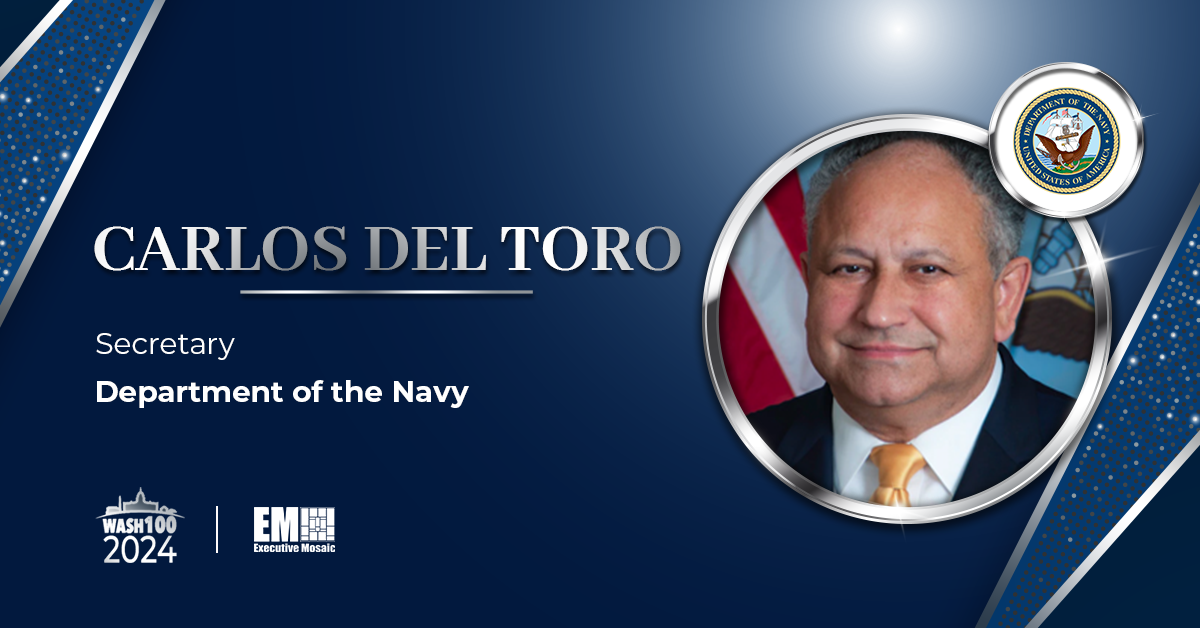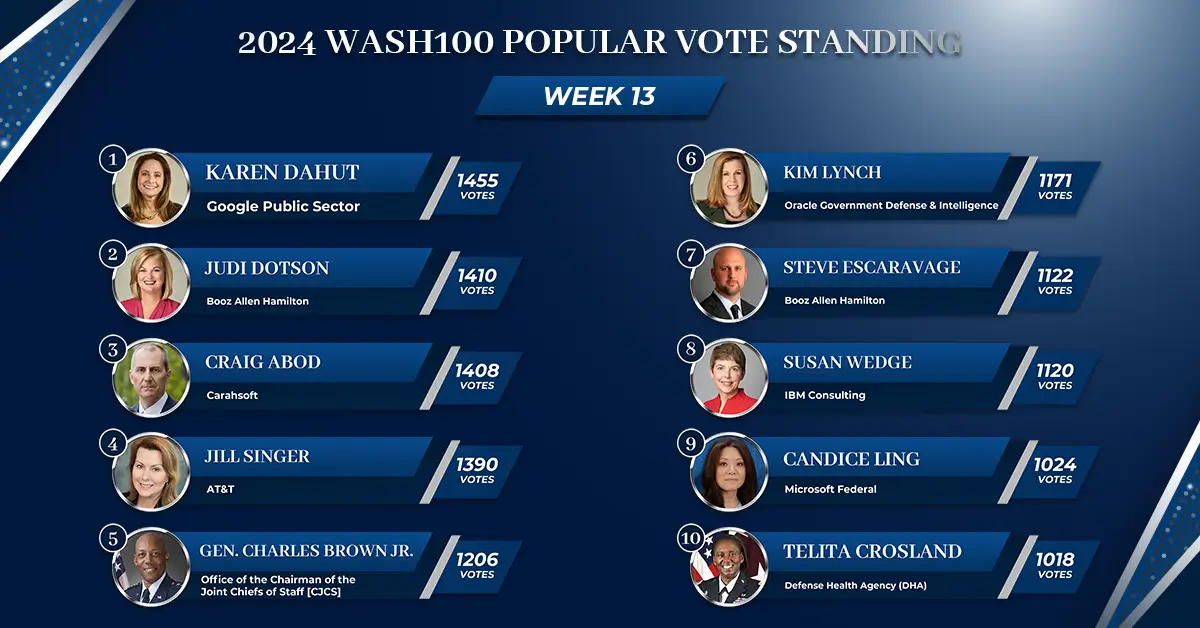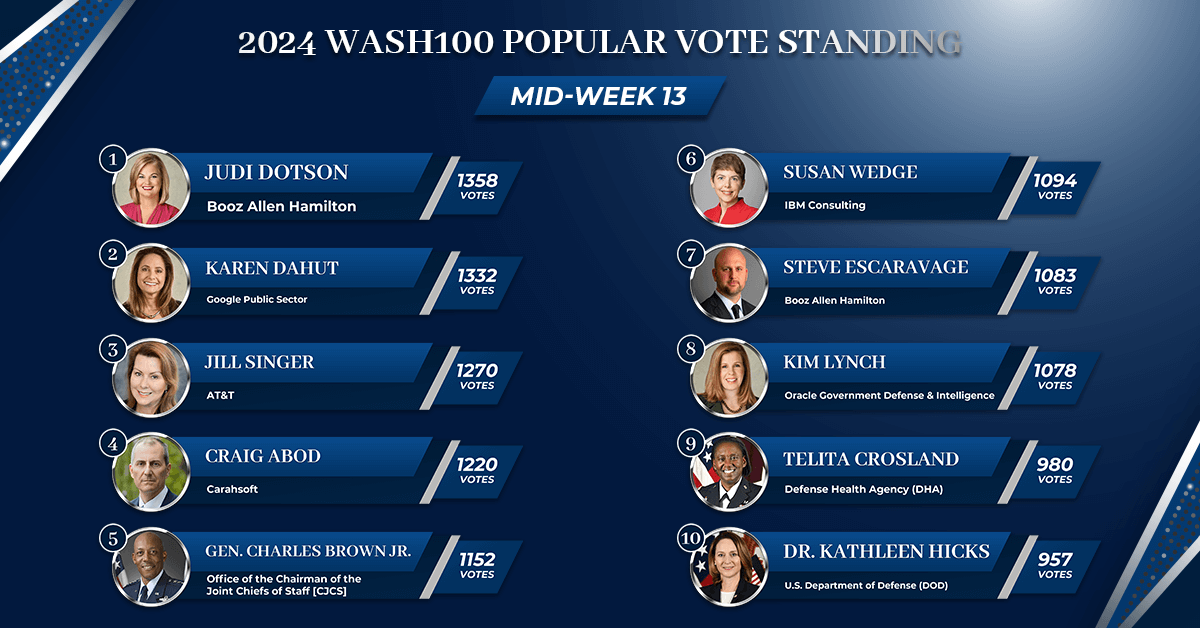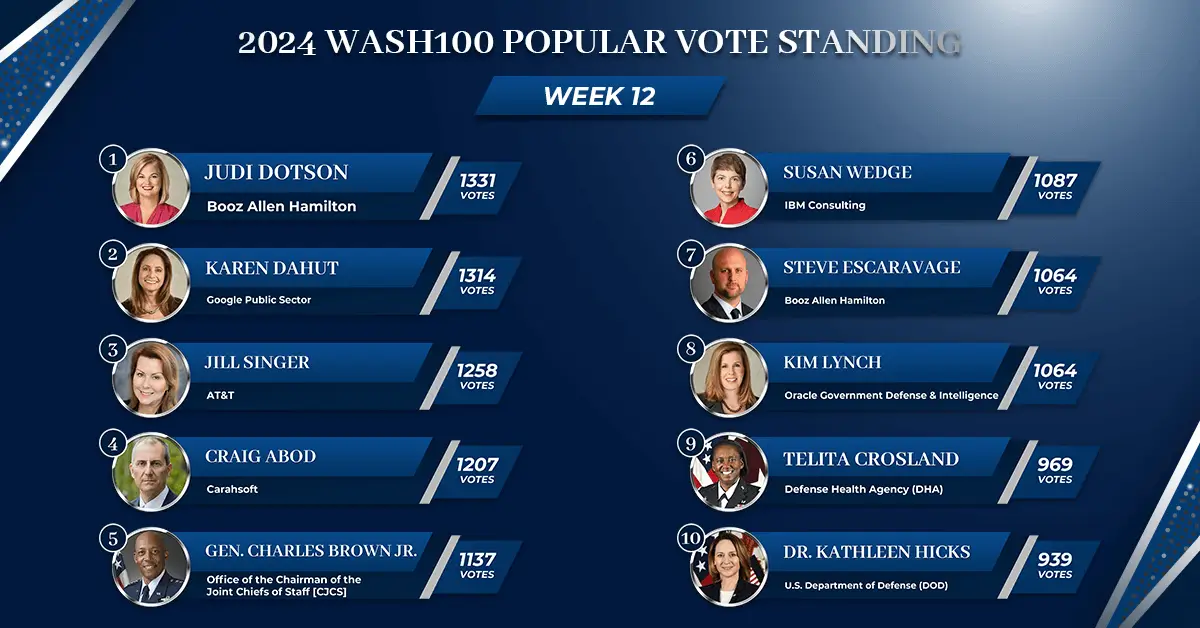Executive Mosaic is honored to announce the selection of Secretary of the Navy Carlos Del Toro as a winner of the Wash100 Award for 2024.
The Popular Vote Competition of the 2024 Wash100 Award runs through April 30, 2024. Click here to vote for Carlos Del Toro as one of your favorite GovCon industry leaders!
The Wash100 Award is an accolade annually conferred upon the 100 most influential and impactful leaders within the government contracting industry.
Del Toro’s win this year is his second straight and second overall.
Regarding this honor, Jim Garrettson, CEO of Executive Mosaic and founder of the Wash100 Award, said, “With a strategic vision and a strong sense of leadership, Secretary Del Toro has taken on the monumental task of building and strengthening U.S. maritime dominance. As the 78th Secretary of the Navy, he works every day to ensure our nation’s warfighters and service members have the ships, weapons and tools they need to win conflicts — a growing priority in the era of global competition. Secretary Del Toro’s commitment to the mission and his unwavering leadership have earned him a place on our Wash100 list for the second year in a row.”
The Navy secretary’s latest win is in recognition of his efforts to ensure the ability of the U.S. to build and sustain a dominant naval force that features advanced technological capabilities, especially autonomy.
This objective is illustrated by the Department of the Navy’s priorities as outlined in the Fiscal Year 2025 President’s Budget request. These priorities include the construction of six battle force ships, continued funding for two upcoming Ford-class aircraft carriers and a second Columbia-class submarine and advanced procurement for a further 10 ships. Also part of the FY2025 priorities list are research and development work for unmanned vehicles and construction projects in support of naval shipyards and various infrastructure.
Key to ensuring the robustness of shipyards and various infrastructure that build and maintain the Navy’s fleet are partnerships with industry. Under Del Toro’s leadership and as articulated in his call for a new Maritime Statecraft, the DON has worked to reinforce these partnerships through various facility visits and meetings with leaders and executives.
In February, Del Toro met with the heads of Vigor Shipyard during a visit to Naval Station Everett, reminding the executives of the need to provide the investment required by ship maintenance and sustainment.
“It is a critical imperative that American companies executing contracts with the Department of the Navy reinvest their capital into training their workforce, improving their infrastructure, and expanding their capacity,” Del Toro said.
Assistant Secretary of the Navy for Research, Development and Acquisition Nickolas Guertin echoed Del Toro’s sentiments during the launch of the Maine Defense Industry Alliance in early March. During the event, Guertin underscored the need for a skilled workforce to carry out the work of building the Navy’s fleet and that “the Navy is ready to partner with organizations like the MDIA to ensure we have the industrial base in place to deliver the capability we need.”
For her part, Assistant Secretary of the Navy for Energy, Installations Environment Meredith Berger reiterated the important role shipyards play in national security during her and Guertin’s visits to the Portsmouth Naval Shipyard and Bath Iron Works, saying, “Our shipyards are a key component of our national defense and we are making sure they are optimized for energy efficiency and resiliency, ensuring these sites can respond to the effects of climate change, sea level rise or any vulnerability.”
The Navy’s outreach to industry goes beyond U.S. shores. In late February, Del Toro visited South Korea, where he toured the shipyards of Hyundai and Hanwha Ocean, whose executives he also met.
Regarding these visits and meetings, Del Toro said, “In each of these engagements, I brought to the table a simple, yet profound opportunity: invest in America. I was enormously gratified by the strong interest expressed by the leaders of each of these world-class shipbuilders in establishing U.S. subsidiaries and investing in shipyards in the United States.”
As part of the same trip to the Asia-Pacific region, the Navy secretary also met with the heads of Namura Shipbuilding and Sasebo Heavy Industries, Mitsubishi Heavy Industries and Japan Marine United during his visit to Japan. As in the meetings in South Korea, Del Toro worked to attract Japanese investment in commercial and naval shipbuilding facilities in the U.S.
But sea power is not just a matter of tonnage; it is also a matter of technology. Just like the other U.S. military services, the Navy, under Del Toro’s guidance, is working to innovate and integrate into its operations unmanned platforms as well.
A critical development in this effort is the standing up of a second Unmanned Surface Vessel Division, USNI News reports. This new squadron, which will focus on small USVs, “is [a] uniformed capability that we’ll be able to own, operate unmanned capabilities that can be employed within particular spaces,” U.S. Pacific Fleet commander Adm. Sam Paparo said at the WEST 2024 conference.
The first USV division was established in 2022 and was tasked to conduct experiments on medium and large USVs. The division’s fleet is set to expand following the launch in January of the third Overlord unmanned surface vessel, dubbed Vanguard. Developed by a team led by L3Harris Technologies and Austal USA, Vanguard will undergo fitting and testing before joining her sister ships, Ranger and Mariner.
The Navy is also collaborating with several industry teams under the Large Unmanned Surface Vessel. Naval News reports that four teams have achieved a key milestone under the program, demonstrating the ability of the engine of their proposed LUSV to operate autonomously for 720 hours.
Another important unmanned systems effort the Navy is working on is the Production-Ready, Inexpensive, Maritime Expeditionary program. In January, the Defense Innovation Unit announced the requirement for production-ready small unmanned surface vehicles that can autonomously cooperate with each other and intercept targets in areas with limited or no access to the global navigation satellite system.
These efforts are sure to bolster the ability of the Navy to carry out its mission, which is important now more than ever amid naval and commercial shipping threats and challenges posed by U.S. adversaries around the world. These efforts are made possible by the vision and leadership exhibited by Del Toro, the very qualities that the Wash100 awards honor and celebrate.
Congratulations to Del Toro and his team for this second Wash100 win!
Click here to choose Carlos Del Toro for the Popular Vote Competition!






